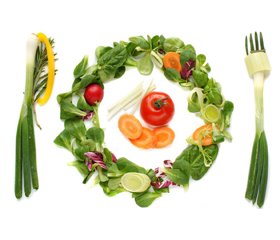Журнал «Почки» Том 12, №2, 2023
Вернуться к номеру
Рослинна їжа в раціоні, вегетаріанство та функція нирок
Авторы: Мельник І.І.
Національний медичний університет імені О.О. Богомольця, м. Київ, Україна
Рубрики: Нефрология
Разделы: Справочник специалиста
Версия для печати
Вегетаріанська дієта, як поширена модель харчування в реальному світі, є привабливою мішенню для вивчення. Попередні дослідження різних років показали, що вегетаріанська дієта пов’язана із зниженим ризиком прогресування хронічної хвороби нирок і зменшенням щорічного відсотка фізіологічної втрати показника швидкості клубочкової фільтрації. Цікавою темою для обговорення є пацієнти-вегетаріанці із захворюваннями нирок, у яких ми маємо моніторувати функцію нирок за допомогою розрахункової швидкості клубочкової фільтрації (рШКФ). У зв’язку із їх способом харчування необхідно пам’ятати, що рШКФ і рівень креатиніну крові в таких пацієнтів будуть низькими порівняно з тими, хто вживає більшу кількість тваринних білків. Це є особливістю метаболізму, і це пов’язано зі способом харчування. Моніторинг функції нирок в таких пацієнтів потребує вірогідних діагностичних маркерів. Тут потрібно знати нефрологічні тонкощі екскреції креатиніну, сечовини, сечової кислоти і цистатину С, враховувати індивідуальні особливості й користуватися науковим обґрунтуванням. Для того, щоб не пропустити прогресування хвороби нирок у пацієнтів-вегетаріанців, необхідно робити комплексну оцінку показників крові — креатиніну, сечовини і сечової кислоти. Або ж альтернативою цим маркерам є можливість використовувати й призначати цистатин С для рШКФ. Цистатин С буде більш надійним маркером, ніж тільки креатинін. Прийняти рішення і скористатися одним з варіантів діагностики для пацієнтів-вегетаріанців залишається на розсуд нефролога залежно від ситуації.
A vegetarian diet as a common dietary pattern in the real world is an attractive target for study. Previous studies from different years have shown that a vegetarian diet is associated with a reduced risk of chronic kidney disease progression and a reduction in the annual percentage of physiological loss of glomerular filtration rate. An interesting topic to discuss is vegetarian patients with kidney diseases, in whom we need to monitor kidney function with estimated glomerular filtration rate. In connection with their diet, it is necessary to remember that glomerular filtration rate and blood creatinine level will be low compared to those who consume a larger amount of animal proteins. This is a feature of metabolism and it is related to the way of eating. Monitoring of kidney function in such patients requires reliable diagnostic markers. Here you need to know the nephrological subtleties of excretion of creatinine, urea, uric acid and cystatin C, take into account individual characteristics and use scientific justifications. In order not to miss the progression of kidney disease in vegetarian patients, it is necessary to make a comprehensive assessment of blood parameters: creatinine, urea and uric acid. An alternative to these markers is the possibility of using and prescribing cystatin C to evaluate estimated glomerular filtration rate. Cystatin C would be a more reliable marker than creatinine alone. It will be at the discretion of the nephrologist depending on the situation to decide and use one of the diagnostic options for vegetarian patients.
вегани; вегетаріанці; функція нирок; хронічна хвороба нирок; клубочкова фільтрація; гіперурикемія; гіперфільтрація; сечова кислота; цистатин С; розрахункова швидкість клубочкової фільтрації
vegans; vegetarians; kidney function; chronic kidney disease; creatinine; glomerular filtration; hyperuricemia; hyperfiltration; uric acid; cystatin C; estimated glomerular filtration rate

